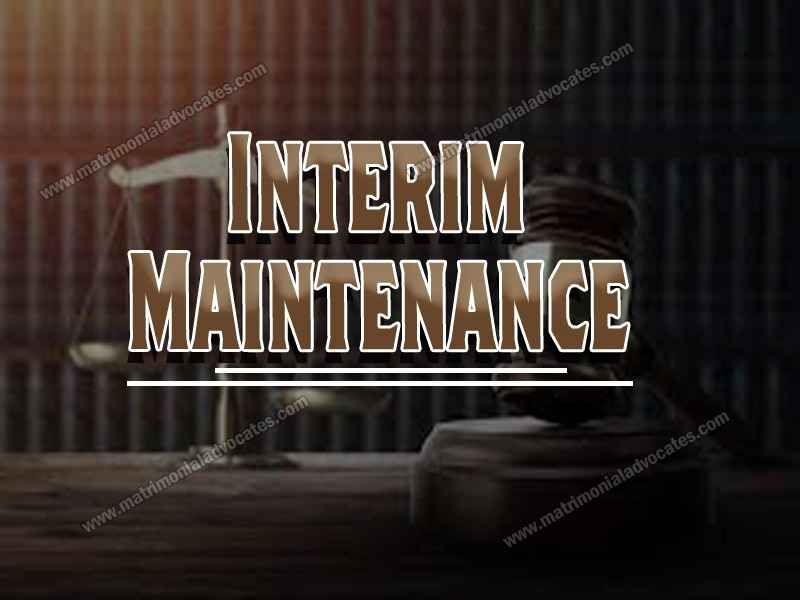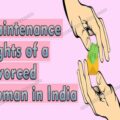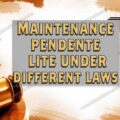
“As per the Hindu Marriage Act, divorce maintenance is about the husband providing financial support for his wife’s living expenses. Generally, it’s not just the wife but the children and her parents are equally entitled to receiving financial aid from the father/husband/son-in-law. There are some provisions that give the wife the right to claim maintenance from her husband. Section 125 of the Criminal Procedure Code (CrPC), 1973 provides an effective remedy for neglected persons to seek maintenance, especially for a wife in India. The law has laid down certain rules to follow in case of providing a specified amount of maintenance, which is applicable due to terms & conditions.”
INTERIM MAINTENANCE
In a divorce proceeding, either spouse can seek relief if the Court is convinced of the insufficiency of income of the applicant under section 24 of the Hindu Marriage Act, 1955. Furthermore, interim relief can be provided to the applicant in order to meet his/her immediate needs. This relief is termed as ‘interim maintenance’ or ‘pendente lite’.
- In furtherance to the Hindu Marriage Act, 1955, interim maintenance can also be sought under section 125 of the Criminal Procedure Code by the wife regarding monthly allowance for maintenance.
- In a case where the wife does not have an independent source of income, the wife, under section 36 of the Special Marriage Act, 1954, can seek expenses from her husband under Chapter V and VI of the Act.
- Where the proceedings are pending under the Parsi Marriage and Divorce Act, 1869, either spouse can claim relief under section 39 of the Act.
- This provision is almost entirely similar to section 36 of the Special Marriage Act, 1954. Interim relief can be sought by Christians under section 36 of the Divorce Act.
Each application filed for interim maintenance has to be disposed of within 60 days of service of notice to the defendant. This provision is uniform in all the legislations mentioned above.
LAWS IN INDIA
Maintenance laws and rules differ from religion to religion. The amount of maintenance fixed by the court depends upon the monthly income of the husband, the income of the wife, his financial status, among other things. India being a democratic country provides its citizens with various laws which are essential in earning a livelihood. A woman is considered as a legal “Wife” of a man, only if their marriage hasn’t proved to be null and void. From the right to the residence at the house of her husband to have an equal share in the property, a legally wedded wife enjoys many rights.
As per the maintenance laws & rights, it is the duty of the husband to pay his wife a lump-sum or monthly payment, known as maintenance, where the maintenance without divorce or after a divorce has to be paid. The amount of maintenance is either decided by a mutual settlement between the husband and wife, or in accordance with the order received from the court. It is the women’s right after divorce in India.
HINDU LAW
- According to the Hindu Marriage Act, 1955 and Hindu Adoption and Maintenance Act, 1956 a divorced woman has a right to claim maintenance under the Hindu Law.
- Under the Hindu Marriage Act, if in any proceeding under this Act, the Court comes to the conclusion that either the wife or the husband has no separate source of income sufficient for their support, it may order for the payment of monthly maintenance to the petitioner through the respondent.
MUSLIM LAW
- Under the purview of Muslim law, a husband is supposed to maintain his wife and family, and the term maintenance signifies the amount he is liable to pay for the same.
- The term used for maintenance under Muslim Law is called nafaqa and it involves food, sustenance, and lodging.
- The wife is usually entitled to obtain maintenance from her husband, despite the fact that she has the appropriate means to maintain herself.
- The law that governs the maintenance of divorced women is the Muslim Women (Protection of Rights on Divorce) Act, 1986.
- A wife has a claim over a fair amount of maintenance by her ex-husband within the given iddat period
- The husband is required to provide ‘Meher’ or ‘Dower’ as promised at the time of the wedding or anytime later
- If during the divorce, the wife is pregnant, she can claim a fair amount of maintenance for at least 2 years from the date of birth of a child
- If they had a child at the time of divorce, a wife can still claim maintenance for the child till the time she remarries or until the child is dependent
- The marriage contract may also stipulate the payment of special allowances by the husband, and in presence of these, it becomes the obligation of the husband to pay these to the wife. Such allowances are called kharch-e-pandan, guzara, mewa khore, etc.
CHRISTIAN LAW
- Under the purview of Christian Law and maintenance, the Indian Divorce Act plays an important role.
- The amount of maintenance mentioned in the act dictates that it cannot be more than one-fifth of the husband’s income. The precondition here is that the woman should not remarry and stay chaste.
- The amount of permanent maintenance depends upon factors like husband’s income, wife’s own income, property, the behavior of both the wife and husband, etc
PARSI LAW
- Under Parsi Law, maintenance is usually similar to the Christian law but here the husband can also claim maintenance and the court cannot offer maintenance beyond the life of the person paying maintenance.
- The usual condition of chastity follows and the amount cannot be more than one-fifth of the spouse’s income.
SPECIAL MARRIAGE ACT
Special Marriage Act, 1954 also allows a divorced wife to claim maintenance and support by charging a quantum on husband’s property depending on the husband’s ability to pay, his property, wife’s own wealth, property and assets, the conduct of both the parties and any other just circumstances. The district court of apt jurisdiction where the application for maintenance is submitted can rescind, modify or vary its order/decree if it is convinced that there is a change in circumstances of either party at any time after the order is passed or if the divorced woman doesn’t remain chaste or single.
SECTION 23
The Protection of Women from Domestic Violence Act, 2005
23. Power to grant interim and ex parte orders.—
(1) In any proceeding before him under this Act, the Magistrate may pass such interim order as he deems just and proper.
(2) If the Magistrate is satisfied that an application prima facie discloses that the respondent is committing, or has committed an act of domestic violence or that there is a likelihood that the respondent may commit an act of domestic violence, he may grant an ex parte order on the basis of the affidavit in such form, as may be prescribed, of the aggrieved person under section 18, section 19, section 20, section 21 or, as the case may be, section 22 against the respondent.
Section 24 in
The Hindu Marriage Act, 1955
Maintenance pendente lite and expenses of proceedings:
—Where in any proceeding under this Act it appears to the court that either the wife or the husband, as the case may be, has no independent income sufficient for her or his support and the necessary expenses of the proceeding, it may, on the application of the wife or the husband, order the respondent to pay to the petitioner the expenses of the proceeding, and monthly during the proceeding such sum as, having regard to the petitioner’s own income and the income of the respondent, it may seem to the court to be reasonable: 54 [Provided that the application for the payment of the expenses of the proceeding and such monthly sum during the proceeding, shall, as far as possible, be disposed of within sixty days from the date of service of notice on the wife or the husband, as the case may be.]
(i) As far as maintenance pendente lite and expenses of proceedings are concerned, no distinction has been made under section 24 of the Act relating to right of a wife for maintenance preferred under section 12 or 13 of the Act; Sandeep Kumar v. State of Jharkhand, AIR 2004 Jhar 22.
(ii) The divorce proceeding has terminated adversely to his client but an appeal is pending. Whether the appeal ends in divorce or not, the wife’s claim for maintenance qua wife under the definition contained in the explanation (b) to section 125 of the code continues unless parties make adjustments and come to terms regarding the quantum or the right to maintenance. It is clear that mere divorce does not end the right to maintenance; Captain, Ramesh Chander v. Veena Kaushal, AIR 1978 SC 1807.
(i) During the pendency of the divorce proceedings at any point of time if the wife establishes that she has no sufficient independent income for her support, it is open to her to claim maintenance pendente lite; Manokaran v. Devaki, AIR 2003 Mad 212.
(ii) Section 24 entitles not only the wife but also the husband to claim maintenance pendente lite on showing that he has no independent source of income. However, the husband will have to satisfy the court that either due to physical or mental disability he is handicapped to earn and support his livelihood. Held that since the husband was able-bodied and was not mentally ill and only because his business had closed down, he could not be granted any maintenance, it being opposed to spirit of section 24 of the Act; Kanchan v. Kamalendra, AIR 1993 Bom 493.
(i) Pending an application either under Rule 5 of Order 9 or Rule 9 of Order 9 or Rule 13 of Order 9 of the Code of Civil Procedure a spouse is entitled to maintain an application under section 24 of Hindu Marriage Act, 1955. The expression proceedings under the Act” appearing in section 24 cannot be given a narrow and restrictive meaning; Vinod Kumar Kejriwal v. Usha Vinod Kejriwal, AIR 1993 Bom 168.
(ii) Section 125(1)(d) has imposed a liability on both the son and the daughter to maintain their father or mother who is unable to maintain himself or herself; Dr. Vijaya Manohar Arbat v. Keshireo Rajaram Sawai, AIR 1987 SC 1100.
(iii) The direction by the Civil Court is not a final determination under the Hindu Adoptions and Maintenance Act but an order pendente lite under section 24 of the Hindu Marriage Act to pay the expenses of the proceeding, and monthly during the proceeding such sum as, having regard to the petitioners own income and the income of the respondent, it may seem to the Court to be reasonable; Captain Ramesh Chander v. Veena Kaushal, AIR 1978 SC 1807.
SECTION 125 CrPC: Order for maintenance of wives, children and parents.
(1) If any person having sufficient means neglects or refuses to maintain-
(a) His wife, unable to maintain herself, or
(b) His legitimate or illegitimate minor child, whether married or not, unable to maintain itself, or
(c) his legitimate or illegitimate child (not being a married daughter) who has attained majority, where such child is, by reason of any physical or mental abnormality or injury unable to maintain itself, or
(d) his father or mother, unable to maintain himself or herself, a Magistrate of the first class may, upon proof of such neglect or refusal, order such person to make a monthly allowance for the maintenance of his wife or such child, father or mother, at such monthly rate not exceeding five hundred rupees in the whole, as such Magistrate thinks fit, and to pay the same to such person as the Magistrate may from time to time direct: Provided that the Magistrate may order the father of a minor female child referred to in clause (b) to make such allowance, until she attains her majority, if the Magistrate is satisfied that the husband of such minor female child, if married, is not possessed of sufficient means. Explanation.- For the purposes of this Chapter,-
(a) ” Minor” means a person who, under the provisions of the Indian Majority Act, 1875 (9 of 1875); is deemed not to have attained his majority;
(b) ” wife” includes a woman who has been divorced by, or has obtained a divorce from, her husband and has not remarried.
(2) Such allowance shall be payable from the date of the order, or, if so ordered, from the date of the application for maintenance.
(3) If any person so ordered fails without sufficient cause to comply with the order, any such Magistrate may, for every breach of the order, issued a warrant for levying the amount due in the manner provided for levying fines, and may sentence such person, for the whole or any part of each month’ s allowances remaining unpaid after the execution of the warrant, to imprisonment for a term which may extend to one month or until payment if sooner made: Provided that no warrant shall be issued for the recovery of any amount due under this section unless application be made to the Court to levy such amount within a period of one year from the date on which it became due: Provided further that if such person offers to maintain his wife on condition of her living with him, and she refuses to live with him, such
Magistrate may consider any grounds of refusal stated by her, and may make an order under this section notwithstanding such offer, if he is satisfied that there is just ground for so doing. Explanation.- If a husband has contracted marriage with another woman or keeps a mistress, it shall be considered to be just ground for his wife’ s refusal to live with him.
(4) No Wife shall be entitled to receive an allowance from her husband under this section if she is living in adultery, or if, without any sufficient reason, she refuses to live with her husband, or if they are living separately by mutual consent.
(5) On proof that any wife in whose favour an order has been made under this section is living in adultery, or that without sufficient reason she refuses to live with her husband, or that they are living separately by mutual consent, the Magistrate shall cancel the order.
Essential conditions for granting Maintenance:
- The reasonable needs of the spouse who is claiming maintenance
- The status of both the parties
- The independent income and property that is owned and possessed by the spouse who is claiming the maintenance
- The number of persons, the spouse who is providing maintenance, has to maintain apart from the claimant.
- The lifestyle that the spouse claiming maintenance used to enjoy in his/her matrimonial home.
- The liabilities of the spouse who is providing maintenance.
- The provisions of the basic necessities of the spouse who is claiming maintenance such as food, shelter, clothing, medical needs, etc.
- The Court may use its discretion when all specific sources of income of the spouse providing maintenance are undisclosed
- The spouse paying maintenance must discharge the cost of litigation of the divorce proceedings
WHEN THE RIGHT OF MAINTENANCE CEASES
The maintenance rights of a divorced woman shall cease when it is found that she has remarried someone or is involved with another person romantically. The husband, in such a case, can bring the matter before the court to modify or rescind the order of maintenance.She is also not entitled to divorce maintenance when she has a job and earns enough for maintaining a standard life. The definition of standard life is subjective in nature.
LANDMARK JUDGEMENTS
The Bench has also re-iterated the following factors to be considered by the Court, while awarding the amount, as held by High Court in :
Sh.Bharat Hegde Vs. Smt.Saroj Hegde[1]
- Status of the parties.
- Reasonable wants of the claimant.
- The independent income and property of the claimant
- The number of persons, the non applicant has to maintain.
- The amount should aid the applicant to live in a similar life style as he/she enjoyed in the matrimonial home.
- Non-applicant’s liabilities, if any.
- Provisions for food, clothing, shelter, education, medical attendance and treatment etc.of the applicant.
- Payment capacity of the non applicant.
- Some guess work is not ruled out while estimating the income of the non applicant when all the sources or correct sources are not disclosed.
- The non applicant to defray the cost of litigation.
- The amount awarded under section 125 Crpc is adjustable against the amount awarded under section 24 of the Act.
Annurita Vohra vs Sandeep Vohra [2]
This revision petition is directed against the Order dated 20.8.2001 whereby the Additional District Judge had granted maintenance at the rate of Rs. 6,000/- per month to the Petitioner/Applicant/Wife for herself and her minor children. The Court had come to the conclusion that the net disposable income of the Respondent/Husband is about Rs.32,000/- per month which is exclusive of his perks and reimbursements. It had also been found that there were no dependents other than the wife and children. In Jasbir Kaur Sehgal v. District Judge, Dehradun and Ors., , it has been observed that – “no set formula can be laid for fixing the amount of maintenance. It has, in the very nature of things, to depend on the facts and circumstances of each case. Some scope for leverage can, however, be always there. The court has to consider the status of the parties, their respective needs, the capacity of the husband to pay having regard to his reasonable expenses for his own maintenance and of those he is obliged under the law and statutory but involuntary payments or deductions. The amount of maintenance fixed for the wife should be such as she can live in reasonable comfort considering her status and the mode of life she was used to when she lived with her husband and also that she does not feel handicapped in the prosecution of her case. At the same time, the amount so fixed cannot be excessive or extortionate”.
UMA V. B.N. CHANDRASHEKARIAH[3]
ORDER
Petitioner is the wife of Respondent. The relationship between the parties is not in dispute. Petitioner has sought restitution of conjugal rights and filed petition under Section 9 of the Hindu Marriage Act before the family Court, Bangalore. In the said matter, the Petitioner filed an application under Section 24 of the Hindu Marriage Act praying for interim maintenance. Said application is rejected by the impugned order.
2. The copy of the application filed by the Petitioner under Section 24 of the Hindu Marriage Act is produced at Annexure-C to the writ petition. Said application is bald and vague. Nothing is stated in the said application/affidavit as to what is the income of the Respondent herein. In the absence of any material on record, the Court below should not have directed the Respondent to pay any amount of maintenance in favour of the Petitioner herein, more particularly when the Petitioner is a salaried lady, inasmuch as, she is getting monthly salary of Rs. 8,900/-(gross). In the absence of any material to show as to what is the income/earning of the Respondent, this Court does not find any ground to interfere in the impugned order, inasmuch as, the Court below has correctly rejected the application filed by the Petitioner.
3. However, the Court below is not justified in observing that the application filed by the Petitioner herein under Section 24 of the Hindu Marriage Act claiming interim maintenance is not maintainable. Such an application praying interim maintenance is maintainable, even in the proceedings arising out of Section 9 of the Hindu Marriage Act. Thus, those observations are clarified accordingly. In view of the above, the prayer of the Petitioner cannot be granted.
Petition fails and the same is dismissed. However, if the Petitioner makes any application in future praying interim maintenance, the same shall be considered by the Court below in accordance with law and on merits without being prejudiced by the impugned order.
Petition is dismissed accordingly.
Manish Jain v. Akanksha Jain[4]
HELD:
“The Court must take into
consideration the status of the parties and the capacity of the spouse to pay
maintenance and whether the applicant has any independent income sufficient for
her or his support. Maintenance is always dependent upon factual
situation; the Court should, therefore, mould the claim for maintenance
determining the quantum-based on various factors brought before the Court.”
[1] 140 (2007) DLT 16, I (2007) DMC 815
[2] 110 (2004) DLT 546, I (2004) DMC 568, 2004 (74) DRJ 99
[3] Writ Petition No. 35886 of 2010 [GM-FC]





